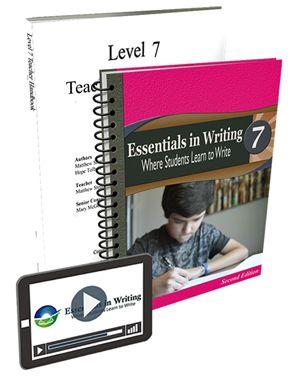Essentials in Writing Level 7 Online Subscription Combo (Subscription + Workbook) 2nd Edition
Lesson-by-lesson video instruction for students For Essentials in Writing, the Student Workbook and Teacher Handbook will be shipped whether Streaming or DVD is selected.
This homeschool writing curriculum features a slow, systematic approach for seventh grade students, aged 12 to 13, to learn to write well. The step-by-step approach allows students to focus on small, daily assignments, so they don’t feel overwhelmed and retain the information.
Includes everything you need:
- Printed Student Text/Workbook
- Printed Teacher Handbook
- 12 month access to ONLINE lesson-by-lesson video instruction (DVDs will not be included - your subscription will arrive by email after your order is invoiced)
- plus Digital Access to the Student Text/Workbook & Teacher Handbook
Lesson-by-lesson video instruction for students For Essentials in Writing, the Student Workbook and Teacher Handbook will be shipped whether Streaming or DVD is selected.
Homeschool students will learn to apply parts of speech as well as use them as tools for effective communication. They will learn to write effectively by using a variety of sentence structures in paragraphs, a narrative, personal and business letters, any essay, and a research project. Students will explore expository, descriptive, persuavive, and compare, and contrast writing.
UNIT ONE: GRAMMAR
Apply Activities for Parts of Speech
- Adjectives
- Action Verbs
- Adverbs
- Prepositional Phrases
- Gerunds
- Vivid Language
Apply activities for sentence structure:
- Independent and Dependent clauses
- Simple and Compound Sentences
- Complex Sentences
- Avoiding Sentence Errors (fragments, run-ons, and comma splices)
- Varied Sentences in a Composition
- Appositives
- Transitions
Apply activities for common problems:
- Pronouns and Antecedents
- Subject/Verb Agreement
- Don’t/Doesn’t Problem
- Homophones
- Unclear Subjects
- Paraphrasing
- Writing a Summary
UNIT TWO: COMPOSITION
Follow the writing process for:
- Paragraphs (expository, persuasive, descriptive, compare, and contrast writing)
- Personal narrative
- Persuasive business letter
- Expository essay
- Descriptive personal letter
- Research project
Additional composition skills:
- Audience and purpose
- How to choose an appropriate writing form
- Informal and formal writing
- Finding and using quality sources to research and explain a topic
- Effective narrative writing skills (first and third-person point of view, mechanics of dialogue, narrative hook, narrative writing)
- Letter formatting (personal letters and business letters)
- Effective writing skills (sensory details, hooks, thesis statement and restatement, mechanics of dialogue, first and third-person point of view, transitions, variety of sentence structures and word choice)
- Summarizing and paraphrasing someone else’s content in their own words
- Develop supportive, strong details and examples
- Author
- Brand / Publisher
- ConsumableContains some consumable pages
- FormatSubscription and Workbook
- Grade LevelGrade 7
- Series
Description
Essentials in Writing Level 7 Online Subscription Combo (Subscription + Workbook) 2nd Edition
Lesson-by-lesson video instruction for students For Essentials in Writing, the Student Workbook and Teacher Handbook will be shipped whether Streaming or DVD is selected.
This homeschool writing curriculum features a slow, systematic approach for seventh grade students, aged 12 to 13, to learn to write well. The step-by-step approach allows students to focus on small, daily assignments, so they don’t feel overwhelmed and retain the information.
Includes everything you need:
- Printed Student Text/Workbook
- Printed Teacher Handbook
- 12 month access to ONLINE lesson-by-lesson video instruction (DVDs will not be included - your subscription will arrive by email after your order is invoiced)
- plus Digital Access to the Student Text/Workbook & Teacher Handbook
Lesson-by-lesson video instruction for students For Essentials in Writing, the Student Workbook and Teacher Handbook will be shipped whether Streaming or DVD is selected.
Homeschool students will learn to apply parts of speech as well as use them as tools for effective communication. They will learn to write effectively by using a variety of sentence structures in paragraphs, a narrative, personal and business letters, any essay, and a research project. Students will explore expository, descriptive, persuavive, and compare, and contrast writing.
UNIT ONE: GRAMMAR
Apply Activities for Parts of Speech
- Adjectives
- Action Verbs
- Adverbs
- Prepositional Phrases
- Gerunds
- Vivid Language
Apply activities for sentence structure:
- Independent and Dependent clauses
- Simple and Compound Sentences
- Complex Sentences
- Avoiding Sentence Errors (fragments, run-ons, and comma splices)
- Varied Sentences in a Composition
- Appositives
- Transitions
Apply activities for common problems:
- Pronouns and Antecedents
- Subject/Verb Agreement
- Don’t/Doesn’t Problem
- Homophones
- Unclear Subjects
- Paraphrasing
- Writing a Summary
UNIT TWO: COMPOSITION
Follow the writing process for:
- Paragraphs (expository, persuasive, descriptive, compare, and contrast writing)
- Personal narrative
- Persuasive business letter
- Expository essay
- Descriptive personal letter
- Research project
Additional composition skills:
- Audience and purpose
- How to choose an appropriate writing form
- Informal and formal writing
- Finding and using quality sources to research and explain a topic
- Effective narrative writing skills (first and third-person point of view, mechanics of dialogue, narrative hook, narrative writing)
- Letter formatting (personal letters and business letters)
- Effective writing skills (sensory details, hooks, thesis statement and restatement, mechanics of dialogue, first and third-person point of view, transitions, variety of sentence structures and word choice)
- Summarizing and paraphrasing someone else’s content in their own words
- Develop supportive, strong details and examples
Product Specs
- Author
- Brand / Publisher
- ConsumableContains some consumable pages
- FormatSubscription and Workbook
- Grade LevelGrade 7
- Series
